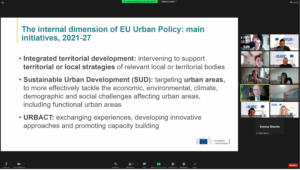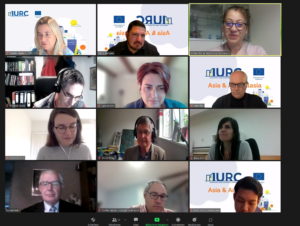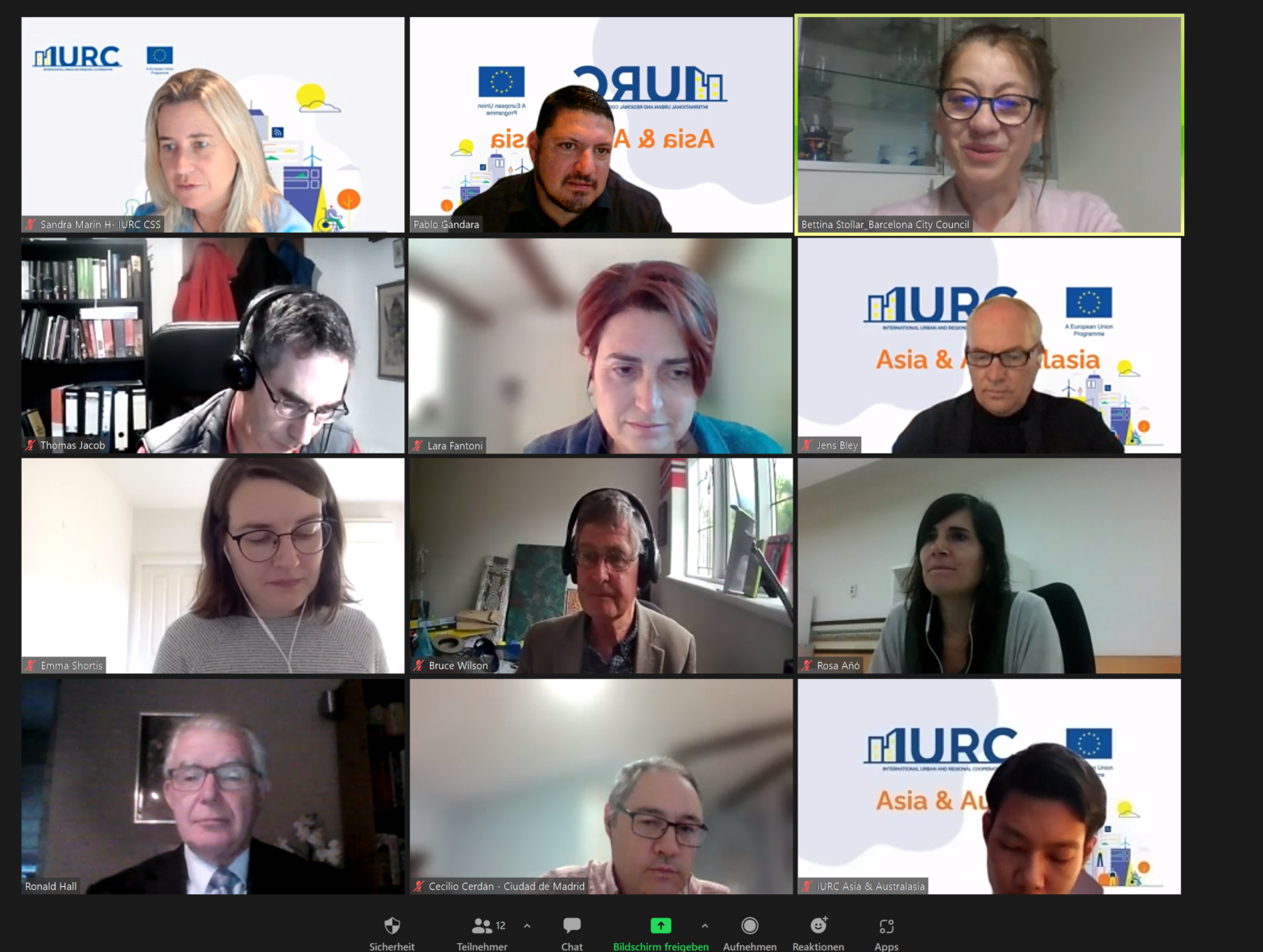Today, the project’s helpdesk based at the RMIT organised a meeting to prep city coordinators from Barcelona, Florence, Hamburg and Madrid for cooperation with Australian cities. Bruce Wilson, who is leading the helpdesk for Australasia, introduced the context in which the cooperation would take place (Covid-19, metropolitan capitals), the active role of the EU Delegation to Australia in initiating cooperation, the prior experiences of Australian cities in previous EU-funded programmes and the topics that Australian cities would be interested in, including recovery from Covid-19, the vitality of city centres, sustainability, climate action, urban planning, mobility and social cohesion.
Ronald Hall, Senior Advisor to the Directorate-General for Regional and Urban Policy of the European Commission, gave a presentation explaining how urban development is a priority for the EU, explaining that in the new financial period (2021-2027), 8% of ERDF is earmarked for urban development. This is delivered through local development partnerships with different programmes on the European Urban Initiative. Dr. Hall also provided relevant information about the previous cooperation between EU and Australian cities within the EU World Cities project (2017-2018).
Pablo Gándara, Team Leader of IURC Asia & Australasia, provided information on the way the cooperation would be implemented for the next 18 months, focusing on the thematic clusters and open pairing approach. He provided examples of successful city-to-city cooperation from the IUC project and some background information on possible Australian cities. He also shared the template for the cities’ start-up reports to be elaborated by the project team and validated by the pilot cities in due time.
Thomas Jacob, Head of International Projects at Hamburg City, reflected on existing cooperation with Melbourne as a result of the EU World Cities project. To establish successful cooperation, he referred to the need of defining a reliable estimation of potentials, common goals, state of the art in selected topics. His city will focus cooperation in three sectors: strategic urban development (resilience to climate change, mixed-use of space, zero-emission-challenge, post-Covid, decentralised structures, etc.) urban mobility (climate-friendly mobility, the role of ITS, „15-min-city“) and circular economy focusing on concrete measures.
Bettina Stollar, Programme Director for Asia-Pacific in Barcelona City Council, shared few challenges the city has faced within the COVID-19 context, including social cohesion. Barcelona aims at addressing climate emergency but also mitigating inequalities while generating wealth and ensuring quality of life. Ms Stollar referred to the city’s cooperation with China within the EU IUC project (2019-2020) and shared some achievements and lessons learned. For the cooperation with Australia, Barcelona aims at involving the Municipal Institute of Urbanism and to share experiences made within the 22@district at Pobleneu and the 22@ Commission which works via quadruple helix cooperation.
Cecilio Cerdán, Director General for Madrid International Relations, mentioned that Madrid is very interested in foster new exchanges with cities to share solutions to current challenges, mostly in sustainability and mobility matters. Mr Cerdán referred to the successful cooperation between Madrid and Buenos Aires within the EU IUC project 2017-2018. For the cooperation with Australia, Madrid wishes to pair especially with Melbourne to deal with green infrastructure in connection with the recovery strategy of the city. Madrid is creating a 75 km long forest ring around the whole city, “El Bosque Metropolitano” a nature-based solution to reduce local heating related to global warming and to improve air quality, he said.
Lara Fantoni from the Metropolitan City of Florence, where she is in charge of Tourism & Culture and cooperating with Strategic Planning, mentioned that the city can offer some good practices of innovative waste management, tending as much as possible to zero-waste solutions. Also, sustainable mobility and transport are a core sector for the Metropolitan City of Florence, which is currently building a super-cycleway linking Florence and Prato where final recycling of bio-waste products and its replicability will be experimented. Ms Fantoni focused on the sustainability of tourism, meaning both coping with the consequences of over-tourism before the pandemic and the absence of tourism during the same, has been reflected upon and experimented in a series of projects.
Since the cooperation between the EU and Australian cities within the IURC programme is also based on thematic networks, Jens Bley, IURC Cluster Manager Smart City & Digital Transition, also joined the session, to offer his views on possible areas of cooperation among the cities.
The names of IURC pilot cities in Australia are expected to be confirmed soon and a kick-off meeting is foreseen for mid-November.


